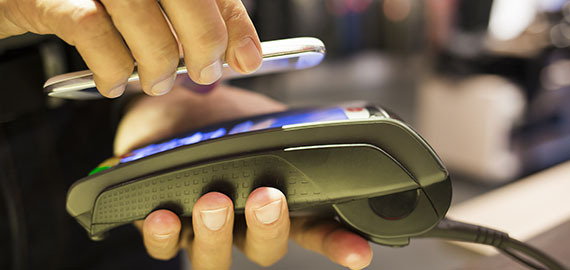The 2015 Google I/O developer conference recently unveiled Android Pay -- Google's answer to Apple Pay. These rivaling mobile payment services are all part of a growing trend of so called "tap and pay" technologies. With these, consumers get to store their credit card information on their mobile devices, and simply 'tap' them when checking out at a merchant to pay for their transaction -- all this thanks to near field communication (NFC) technology present in most high-end mobile devices. Other companies are also gearing up to join the fray, including tech giant Samsung.
Part of being successful means gaining widespread acceptance from both businesses and consumers. As we will explore below, the overall economic climate currently leaves both parties open for Android Pay, and similar products, to seize the opportunity and make a play for the payment processing market.
Why Merchants May be Willing to Invest in NFC Readers
Beginning in October 2015, businesses that do not support EMV/Smartchip payments will be held liable for any fraudulent purchases made at their stores -- this is a change from banks and financial institutions being held accountable previously. As a result, many U.S. merchants are already upgrading their card readers to support new EMV chips. If these vendors are concerned about being able to accommodate this growing population of contactless payments, they have an existing excuse to upgrade their technology to suit it.
Furthermore, cheaper technologies for accepting NFC are currently emerging. Most notably, Square, a San Francisco based start-up, offers cheap credit card readers, which now support EMV and NFC technologies. Since its inception, it has been spreading like wildfire due to the low cost terminals and simplicity of use. Square's popularity is sure to fire up competition, which will serve to further benefit businesses.
The downside many merchants must face, when opting for products such as Square, are slightly elevated discount rates. Square takes a 2.75 percent cut of every sale used with the help of its product (or 3.5 percent + $0.15 for manually entered transactions). Typically, other payment processors charge approximately 2 percent for similar transactions.
Greater Security: Why More Consumers Are Happy to Play Along
One of the biggest selling points made by Apple, in its continued campaign for its NFC payment systems, has been the improvement to user security. Thanks to a data security feature known as 'tokenization', credit card information being handled by the merchant is obscured and safeguarded against anyone trying to intercept it. By all accounts, Android Pay will use a similar tokenization system in the way it works. This will all, in theory, lend itself to more secure credit card payments.
With credit card breaches making the news, seemingly every single day, a bigger part of the general population now concerns themselves with the security of their credit card details. Greater security is, after all, one of the biggest reasons why the aforementioned EMV technology will now be coming to the United States -- smartchip credit cards are hypothetically more difficult to counterfeit and exploit than magnetic strip credit cards.
Consumers should be aware that mobile payments, such as these, are far from completely secure. In fact, several Apple Pay exploits have surfaced in recent months. Once it launches, Android Pay is sure to face similar issues -- the more people have the ability to test its infrastructure, the greater the odds of them finding ways of breaking and exploiting it.


